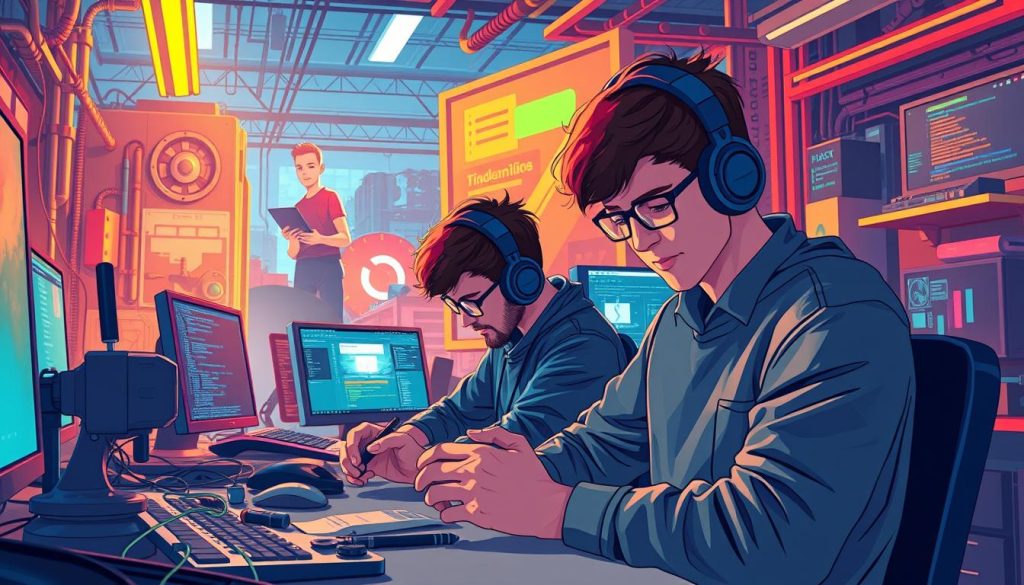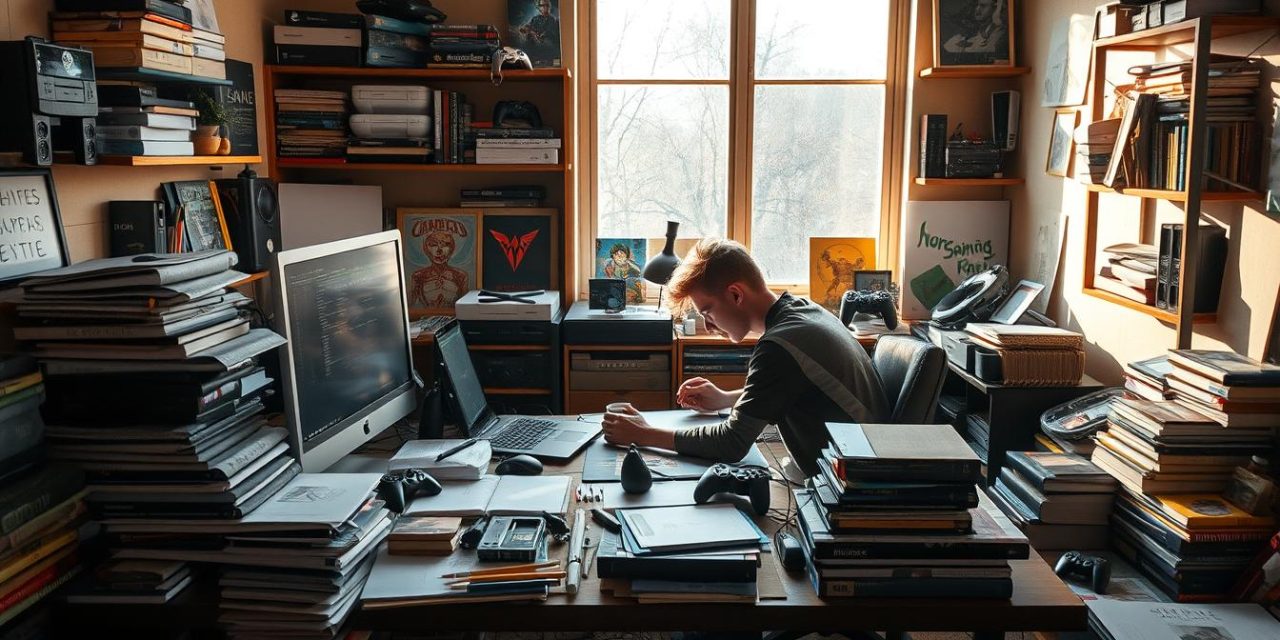Have you ever dreamed of creating your own video game? Turning your creative vision into an interactive experience is now more accessible than ever. The world of game creation blends artistic design with technical programming to bring ideas to life.
Skilled professionals specialize in this exciting field. They work on diverse projects across mobile, web, and gaming platforms. These experts handle everything from initial concept to final testing.
Platforms like Freelancer.com connect clients with top-rated talent. These specialists have earned a 4.9/5 rating from thousands of reviews. They offer flexibility and specialized knowledge that in-house teams might lack.
Choosing the right partner is crucial for project success. This guide will help you navigate the process. Discover how to transform your gaming concept into reality with the perfect collaboration.
Table of Contents
Key Takeaways
- Game development combines creative art with technical programming skills
- Freelance professionals offer flexible expertise across multiple platforms
- Platforms like Freelancer.com provide access to highly-rated specialists
- Successful projects require careful selection of development partners
- Services range from initial concept design to final testing phases
- Client satisfaction rates indicate reliable quality and service
- Freelance options provide cost-effective solutions for game creation
What is a Freelance Game Developer?
Creative technologists who build immersive worlds for different gaming systems offer flexible collaboration options. These professionals craft interactive experiences across PC, mobile, and console platforms.
Many specialists focus on specific aspects of the creation process. Some excel at programming complex mechanics. Others master artistic elements like character design and animation.
These creators often work independently or in small collaborative teams. This approach brings creative concepts to reality with personalized attention. Their adaptable nature contrasts with larger app development companies that may lack project-specific focus.
You’ll typically find these talented individuals on professional platforms. Sites like Freelancer.com and Guru connect them with exciting opportunities. They showcase their portfolios and seek projects that match their skills.
Most possess strong educational backgrounds in relevant fields. Computer science and interactive design programs provide essential foundations. This training combines technical knowledge with creative problem-solving abilities.
« The best interactive experiences emerge when technical precision meets artistic vision »
Some professionals operate as independent creators outside studio systems. They conceive, build, and market their own digital entertainment products. This indie approach demonstrates complete creative control from concept to completion.
The role demands a unique blend of logical thinking and artistic sensibility. Programming architecture must harmonize with visual aesthetics. Technical execution supports the overall player experience.
Hiring these specialists proves cost-effective for many businesses and individuals. They transform innovative ideas into engaging software without large studio overhead. This makes professional-quality development accessible for various budgets.
Project examples span simple mobile puzzles to complex virtual reality adventures. Each creation demonstrates technical skill and creative vision. The diversity showcases adaptability across different platforms and genres.
What Do Freelance Game Developers Do?
Creative professionals handle every aspect of bringing interactive entertainment to life. They transform abstract ideas into playable experiences across multiple platforms.
These specialists manage the complete creation journey from start to finish. Their work combines technical skills with artistic vision to produce engaging digital products.

Ideation and Storyline Creation
The initial phase focuses on brainstorming innovative concepts. Professionals develop compelling narratives that form the foundation of the player’s journey.
They craft detailed character backgrounds and world-building elements. This creative process establishes the emotional core of the interactive experience.
Story arcs and plot progression receive careful attention during this stage. These elements ensure players remain engaged throughout their adventure.
Game and App Design
Structural planning comes next in the development process. Experts design intuitive user interfaces that enhance player interaction.
Layout creation focuses on visual appeal and functional clarity. Level design specialists map out progression systems and challenge curves.
Mobile app considerations include touch controls and screen optimization. These design choices directly impact user satisfaction and retention.
Coding and Programming
Technical implementation brings designs to life through code. Professionals use languages like C++ and C# to build functional frameworks.
Game engines such as Unity and Unreal Engine provide powerful development tools. These platforms enable efficient creation of complex mechanics.
Physics engines and animation systems receive specialized programming attention. This technical work ensures smooth and responsive gameplay.
Testing and Debugging
Quality assurance forms the final crucial phase of development. Rigorous testing identifies issues across different devices and platforms.
Professionals create comprehensive unit tests and validation procedures. They document technical specifications and performance metrics.
Bug fixing and optimization ensure polished final products. This attention to detail separates amateur projects from professional releases.
Collaboration remains essential throughout all development stages. Specialists work with artists, designers, and sound experts.
This teamwork creates cohesive products where all elements harmonize perfectly. Communication skills prove as important as technical abilities.
| Development Phase | Key Activities | Common Tools Used |
|---|---|---|
| Concept Development | Story creation, character design, world building | Writing software, design tools |
| Technical Implementation | Programming, engine work, mechanics development | Unity, Unreal Engine, Visual Studio |
| Visual Creation | Asset production, animation, interface design | Blender, Photoshop, Illustrator |
| Quality Assurance | Testing, debugging, performance optimization | Testing frameworks, analytics tools |
| Final Polish | Bug fixes, user experience refinement, publishing | Version control, deployment platforms |
Monetization strategies and player retention features often receive special attention. These elements help ensure commercial success alongside creative achievement.
The complete journey from initial concept to final delivery demonstrates comprehensive expertise. Each phase contributes to creating memorable interactive experiences.
Key Areas of Game Development Expertise
Building great interactive entertainment requires specialized skills across multiple disciplines. Each area contributes unique elements to the final product.
Professionals often focus on specific aspects of the creation process. Some master technical implementation while others excel at visual storytelling.
Understanding these specialties helps when assembling your project team. You can identify exactly which skills your creation needs most.
Game Programming
Technical experts write the code that makes everything work. They use languages like Java, Python, and C# to build functional systems.
These specialists create responsive gameplay mechanics and smart AI behaviors. They ensure smooth performance across different devices.
User interfaces and control systems receive careful programming attention. This technical work forms the foundation of the player experience.
Game Design
Creative professionals craft the rules and systems that define interaction. They balance challenge and reward to maintain engagement.
These designers shape the overall player journey from start to finish. Their work determines how people will experience the digital world.
Fun factor and replay value receive special consideration during design. This creative planning ensures lasting appeal.
Game Art and Animation
Visual artists create stunning 2D and 3D assets that bring worlds to life. They design characters, environments, and special effects.
Animation specialists make everything move with personality and style. Their work adds emotional depth to interactive experiences.
Tools like Adobe Photoshop and Blender help create professional visuals. These artistic elements define the game’s visual identity.
Sound Design
Audio experts compose music and create effects that enhance immersion. They design sonic landscapes that support the visual experience.
Voiceover work and ambient sounds receive careful attention. These auditory elements significantly impact emotional engagement.
Great sound design makes worlds feel alive and responsive. It completes the sensory experience for players.
Level Design
Environment specialists build the spaces where gameplay happens. They create challenges and progression paths that feel natural.
These designers balance visual appeal with functional layout. Their work directly affects how players navigate and explore.
Pacing and difficulty curves receive special attention. This ensures smooth progression through the experience.
« The magic happens when all these specialties work together harmoniously »
Many professionals specialize in one area while understanding others. This helps collaboration across different aspects of development.
Engines like Unity and Unreal Engine provide tools for various specialties. They enable efficient teamwork across different disciplines.
Some projects might need a single specialist for a specific task. Others require a complete team covering all expertise areas.
Mobile app development often combines several skills into smaller teams. Virtual reality projects might need specialized knowledge in multiple areas.
Identifying your project’s specific needs helps find the right talent. This ensures every aspect receives proper attention.
Collaboration between different experts creates polished final products. Communication skills prove as important as technical abilities.
The right combination of specialties brings creative visions to life. Each contributor adds their unique expertise to the collective effort.
Benefits of Hiring a Freelance Game Developer
Working with independent specialists offers numerous advantages for your creative projects. These professionals bring fresh perspectives and specialized knowledge to every assignment.
Cost efficiency stands out as a major benefit. You avoid the expenses of full-time salaries and benefits. This approach lets you invest more resources directly into your project.

Flexibility becomes another significant advantage. You can scale your team up or down based on current needs. This adaptability proves perfect for projects with changing requirements.
Access to specialized skills enhances your final product. These experts often focus on specific areas like character animation or gameplay mechanics. Their targeted knowledge elevates every aspect of your creation.
Creative input from experienced professionals transforms your vision. They suggest improvements you might not have considered. This collaboration often leads to more engaging player experiences.
Quick onboarding helps meet tight deadlines. Many specialists can start immediately on your mobile app or web platform. This speed keeps your development process moving forward.
Skill gap filling completes your existing team’s capabilities. Maybe you need someone with Unity engine expertise. Or perhaps your project requires advanced level design knowledge.
Remote work reduces overhead costs significantly. No need for additional office space or equipment. This efficiency makes professional quality more accessible.
Global talent pools offer diverse perspectives. You can find the perfect match for your specific needs. Cultural differences often inspire innovative solutions.
Successful projects demonstrate these advantages clearly. Many popular mobile games began with small collaborative teams. Virtual reality experiences often benefit from specialized input.
Consider these professionals for your next undertaking. Their unique combination of skills and flexibility delivers outstanding results. You’ll appreciate the quality and efficiency they bring.
Where to Find Top Freelance Game Developers
Locating expert professionals for your development needs requires strategic platform selection. The right channels connect you with skilled creators who can bring your vision to reality.
Freelance Marketplaces
Specialized platforms offer structured environments for hiring talent. Sites like Freelancer.com and Guru provide organized spaces for project collaboration.
These marketplaces allow you to post detailed project requirements. Creative professionals then submit proposals with their expertise and rates.
You can review comprehensive profiles showcasing past work and client feedback. Many platforms feature rating systems that highlight top performers.
Some services charge subscription or project fees for their matching services. Others offer free job postings with premium features available.
Payment protection systems like SafePay ensure secure financial transactions. This builds trust between clients and creative specialists.
Online Job Boards
General employment platforms serve as excellent alternatives for finding talent. These sites attract diverse professionals across various specialties.
Job boards enable direct communication with potential team members. You can discuss project specifics before making hiring decisions.
Portfolio review becomes straightforward through these channels. Many professionals maintain detailed showcases of their previous work.
Global talent pools become accessible through online platforms. You can find specialists in specific areas like Unity or Unreal Engine development.
Successful collaborations often begin with thorough profile examination. Client satisfaction rates indicate reliable service quality.
Exploring multiple platforms helps find the perfect match for your specific needs. Each site offers unique features and talent pools.
For those seeking opportunities in the French market, specialized resources like mission search platforms for independent professionals provide targeted connections.
Detailed project descriptions attract the most qualified candidates. Clear budgets and timelines help professionals understand your vision.
Reputable sites minimize potential issues through verification systems. They create safe environments for creative partnerships.
« The right platform transforms your search from overwhelming to perfectly targeted »
Platform diversity ensures you’ll find specialists for any aspect of creation. Whether you need programming expertise or artistic vision, these channels deliver.
Time investment in platform research pays dividends in project quality. The perfect partnership begins with the right connection point.
How to Write a Job Description to Hire a Game Developer
Your hiring success begins with a clear, comprehensive description that attracts the right technical and artistic specialists. This document serves as your project’s first introduction to potential collaborators.
A well-crafted position posting filters unqualified applicants immediately. It saves valuable time in the selection process. Quality candidates appreciate detailed requirements that match their expertise.

Start with a compelling project overview that captures creative vision. Describe your interactive concept and its unique appeal. This helps specialists understand your artistic direction.
Clearly outline required technical skills and software proficiency. Mention specific programming languages like C++ or C#. Include essential tools and platforms such as Unity or Unreal Engine.
Specify your target platforms like mobile, web, or PC systems. Different devices require specialized knowledge and optimization techniques. This ensures you attract professionals with relevant experience.
Define the game genre whether RPG, strategy, or action-adventure. Each category demands particular design approaches and mechanics. Genre specification helps match your project with appropriate talent.
« The best job descriptions attract the right talent by speaking their technical language while inspiring creative passion »
Portfolio expectations should highlight past work quality and specific contributions. Request examples that demonstrate relevant skills for your project. Look for evidence of completed projects from concept to reality.
Don’t overlook soft skills like communication and problem-solving abilities. Team collaboration often determines project success more than technical prowess alone. These interpersonal qualities ensure smooth development processes.
Set realistic timelines and transparent budgets from the beginning. Clear expectations prevent misunderstandings during the engagement. This honesty attracts professionals who appreciate well-organized projects.
Consider mentioning regional preferences or time zone requirements if relevant. This can streamline communication and workflow coordination. However, remain open to global talent for specialized skills.
Incorporate relevant keywords throughout your description for better visibility. Terms like « gameplay mechanics » or « level design » help specialists find your posting. Platform algorithms favor well-optimized job listings.
Be transparent about project challenges and ambitious goals. This honesty attracts committed professionals who enjoy solving complex problems. It builds trust from the initial contact stage.
A thorough job description acts as your first quality filter in the hiring process. It ensures only qualified, interested candidates apply for your position. This efficiency benefits both clients and specialists.
| Job Description Element | Key Details to Include | Why It Matters |
|---|---|---|
| Project Overview | Creative vision, genre, target audience | Attracts specialists aligned with your concept |
| Technical Requirements | Programming languages, engines, tools | Filters candidates with right technical skills |
| Platform Specifications | Mobile, web, PC, or console focus | Ensures platform-specific expertise |
| Experience Level | Years in industry, project types completed | Matches skill level with project complexity |
| Portfolio Expectations | Examples of past work, specific contributions | Demonstrates practical ability and quality |
| Soft Skills | Communication, teamwork, problem-solving | Ensures smooth collaboration and workflow |
| Timeline & Budget | Realistic schedules, transparent compensation | Sets clear expectations from the beginning |
Remember that your job description represents your project’s professionalism. It signals how seriously you approach the development process. Quality specialists respond to well-organized opportunities.
Invest time in crafting this crucial document before posting it anywhere. The effort pays dividends through better candidate matches and smoother collaborations. Your perfect team member awaits the right invitation.
Screening and Selecting the Right Candidate
Finding the perfect creative partner requires careful evaluation across multiple dimensions. Your selection process determines whether your vision becomes reality or remains just a concept.
Effective screening combines technical assessment with interpersonal evaluation. This comprehensive approach ensures you find professionals who excel at both creation and collaboration.
Technical Skills Assessment
Practical testing reveals true programming proficiency. Create coding challenges that mirror real project requirements.
Evaluate engine expertise through specific platform tests. Unity and Unreal Engine assessments show practical knowledge.
Review portfolios for relevant project experience. Look for completed work similar to your vision.
Test animation and art skills with practical assignments. These demonstrate technical execution abilities.
Platform-specific knowledge matters greatly. Mobile development requires different optimization than web or PC projects.
Gameplay mechanics creation tests problem-solving abilities. Watch how candidates approach complex design challenges.
Evaluating Soft Skills
Communication abilities impact project success more than technical skills alone. Assess how clearly candidates explain complex concepts.
Collaboration skills become evident during team interviews. Involve your existing members in the evaluation process.
Problem-solving approaches reveal creative thinking patterns. Present real development challenges and observe solutions.
Time management and meeting deadlines show professional discipline. Reference checks confirm these behavioral patterns.
Cultural fit matters for long-term projects. Ensure values and work styles align with your team’s approach.
« The best collaborators combine technical mastery with emotional intelligence »
Conducting Background Checks
Verification ensures credentials match claims. Contact educational institutions for qualification confirmation.
Previous employment validation provides performance insights. Speak directly with past clients and collaborators.
Portfolio authenticity checks protect against misrepresentation. Verify candidate involvement in showcased projects.
Client testimonials offer valuable third-party perspectives. These reveal consistent performance patterns.
Online presence examination provides additional context. Professional networks often showcase community standing.
Thorough screening reduces hiring risks significantly. It ensures you invest in truly qualified professionals.
- Create practical tests matching your project’s technical requirements
- Conduct structured interviews assessing communication and problem-solving
- Verify all credentials through official channels and references
- Include team members in evaluation for collaboration assessment
- Compare candidates across both technical and interpersonal criteria
- Request specific examples of past challenge resolution
- Check platform-specific experience relevance
- Assess cultural fit through multiple interaction points
- Validate portfolio work through direct client confirmation
- Consider trial periods for complex or long-term engagements
This comprehensive approach identifies professionals who transform concepts into engaging player experiences. Your careful selection ensures project success from start to finish.
Essential Interview Questions for a Game Developer
Finding the right talent requires asking the right questions during interviews. Your questions reveal technical skills and creative thinking abilities.
Good questions help you understand a candidate’s approach to complex challenges. They show how someone handles pressure and collaboration.

Start by exploring their development process for recent projects. Ask about their role from initial concept to final testing. This reveals their understanding of complete project lifecycles.
Inquire about their experience with specific software and platforms. Unity and Unreal Engine knowledge often proves essential for modern development. Understanding their tool preferences shows their technical comfort zone.
Collaboration methods deserve special attention during conversations. Ask about their communication style within creative teams. This helps assess their fit with your existing workflow.
Testing approaches demonstrate their quality assurance mindset. Request specific examples of their debugging methods. This reveals their attention to detail and problem-solving skills.
Past work examples provide concrete evidence of their capabilities. Ask them to walk through their portfolio piece by piece. Request detailed explanations of their specific contributions to each project.
Genre experience shows their versatility and specialization areas. Inquire about their work across different interactive categories. This helps match their strengths with your project needs.
Deadline handling reveals their time management abilities. Ask about experiences with tight schedules and unexpected challenges. Their answers show professionalism under pressure.
Feedback adaptation demonstrates their learning mindset. Inquire about how they incorporate suggestions into their work. This shows their flexibility and growth potential.
Long-term availability affects project continuity. Discuss their commitment timeline and other obligations. This ensures alignment with your development schedule.
« The best interviews feel like conversations between passionate creators rather than interrogations »
Cultural fit questions reveal values and work ethics. Ask about their ideal work environment and team dynamics. These answers help predict collaboration success.
Technical questions should cover specific platform requirements. Mobile development needs differ from web or PC projects. Ensure their expertise matches your target platforms.
Creative vision questions explore their design philosophy. Ask how they balance artistic goals with technical constraints. This reveals their problem-solving approach.
Communication skills affect every aspect of collaboration. Observe how clearly they explain complex technical concepts. This indicates their ability to work with diverse team members.
Reference checks provide valuable third-party perspectives. Always contact previous clients or collaborators. Their insights complete your understanding of the candidate.
| Question Category | Sample Questions | What It Reveals |
|---|---|---|
| Technical Skills | Which engines are you most proficient with? How do you optimize for different platforms? | Software expertise and platform-specific knowledge |
| Project Experience | Walk me through your last complete project. What were your specific contributions? | Practical experience and role understanding |
| Collaboration Style | How do you handle creative disagreements? What’s your preferred communication method? | Teamwork abilities and conflict resolution |
| Problem-Solving | Describe a challenging bug you fixed. How do you approach tight deadlines? | Critical thinking and pressure management |
| Creative Process | How do you balance visual design with performance? What’s your approach to player feedback? | Design philosophy and user focus |
| Professional Growth | What skills are you currently improving? How do you stay updated with industry trends? | Learning mindset and career development |
Remember that the best candidates ask thoughtful questions too. Their curiosity about your project shows genuine interest. This mutual engagement often predicts successful partnerships.
Take notes during conversations to compare candidates later. Look for specific examples rather than general statements. Concrete evidence always beats vague promises.
Trust your instincts about personality fits and red flags. Technical skills can be taught, but attitude and work ethic often remain constant. Choose someone who excites you about the collaboration.
Follow up with practical tests for final candidates. Short assignments reveal real skills better than interviews alone. This final step ensures you make the right choice.
Potential Red Flags When Hiring a Freelancer
Spotting warning signs early saves your project from costly mistakes. Some professionals present themselves better than their actual skills.
Watch for missing portfolio examples during initial discussions. Quality creators always showcase completed work. This demonstrates their ability to deliver real results.
Poor communication patterns signal potential problems. Delayed responses or vague answers create uncertainty. Clear interaction remains essential for successful collaboration.
Unrealistic promises often indicate inexperience. Complex projects require reasonable timeframes. Beware of specialists claiming impossibly fast completion.
Vague descriptions of past contributions raise concerns. Professionals clearly explain their specific roles. This transparency builds trust in their capabilities.
« Trust emerges from clear communication and demonstrable skills, not impressive claims »
Unresponsive behavior during hiring suggests future reliability issues. Consistent engagement shows professional commitment. This pattern often continues throughout the development process.
Missing references or unverifiable background information presents risks. Reputable specialists provide contactable previous clients. These connections validate their work history and quality.
Limited knowledge of standard tools indicates insufficient experience. Familiarity with popular engines and programming languages proves essential. This technical foundation supports quality results.
Lack of passion for interactive creation affects final product quality. Genuine enthusiasm drives innovation and problem-solving. This emotional investment translates into better player experiences.
These warning signs can lead to project delays and budget overruns. Poor quality work requires expensive fixes. Careful selection prevents these frustrating scenarios.
Trust your instincts when something feels questionable. Professional partnerships should inspire confidence from the beginning. Your careful evaluation protects your creative vision.
Conclusion: Bringing Your Game Vision to Life
Transforming your creative concept into a playable reality is an exciting journey. The right specialist brings technical skill and artistic vision to your project.
Online platforms connect you with talented professionals who understand interactive creation. They offer flexible collaboration and cost-effective solutions.
Focus on both technical abilities and communication skills during selection. Start with smaller projects to test capabilities before larger commitments.
Clear expectations and regular feedback ensure smooth development. Your vision deserves the perfect partnership to become engaging player experiences.
Post your project today and watch your ideas transform into incredible interactive adventures. The journey from concept to completion begins with finding the right creative partner.
FAQ
What services do freelance game developers offer?
They provide a wide range of services including coding, design, animation, sound, and testing. These professionals help bring your vision to life from concept to completion.
How do I find the right freelance game developer for my project?
You can find talented individuals on platforms like Upwork, Toptal, and through online job boards. Look for portfolios that match your style and project needs.
What should I look for in a job description when hiring?
Be clear about your project’s scope, required skills, and timeline. Mention specific engines like Unity or Unreal if needed, and highlight any unique aspects of your game.
How can I assess a candidate’s technical skills?
Review their portfolio, ask for code samples, and consider a small test project. This helps ensure they have the expertise needed for your specific requirements.
What are common red flags when hiring a freelancer?
Watch out for poor communication, unclear portfolios, and unrealistic promises. Always check references and past client feedback to avoid potential issues.
Why is level design important in game development?
Level design shapes the player’s experience, guiding them through challenges and story. It’s crucial for engagement and ensuring your game feels immersive and fun.





